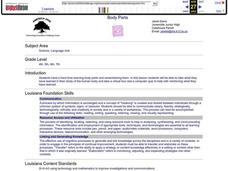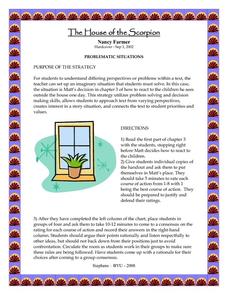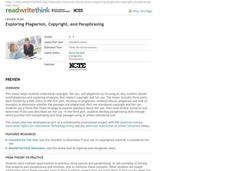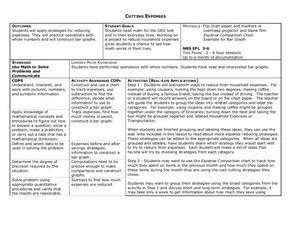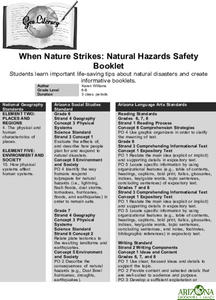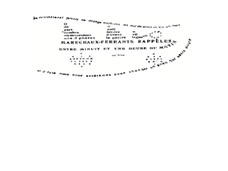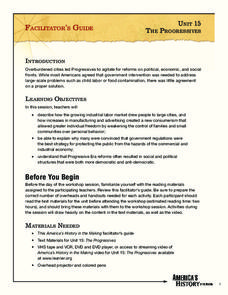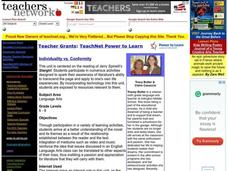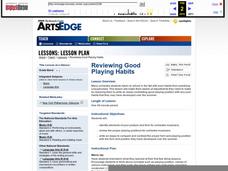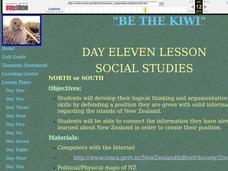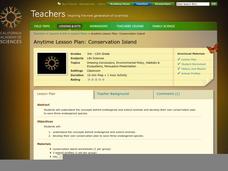Curated OER
The Prince and the Pauper
Mark Twain, the famous American author, is often studied in the school system. Use "The Prince and the Pauper" to analyze the differences between the text and its video version. This lesson includes several culminating project...
Curated OER
Body Parts
Students discuss the importance of systems of the human body and ways each has its own function while relying on the others. Students work in groups to research their assigned system. They complete a report. Students take virtual tours...
Curated OER
Lesson 3: Number Sense
Learners solve word problems using number sense. They convert fractions to decimals and mixed numbers. Pupils determine if a given fraction is greater or less than another fraction, and order numbers on a number line.
Curated OER
Note-Taking: K.I.S.S. "Keep It Short and Simple"
Note-taking is an essential study skill, and it needs to be taught! In the context of a research project on energy sources, learners find multiple sources, evaluating, paraphrasing, and citing them correctly. Two lists with note-taking...
Australian National Schools Network
Habits of Mind Posters
If you are implementing the 16 Habits of Mind into your class and curriculum, check out this set of posters that you can display in your room. Each poster highlights one Habit of Mind and includes a brief description of...
Gourmet Curriculum Press
Author's Purpose
Who knew determining author's purpose could be turned into a game? Four teams compete to correctly identify the author's purpose for writing a series of passages.
Novelinks
The House of the Scorpion: Problematic Situations
What should Matt do? Readers of The House of the Scorpion are offered several possible actions Matt could take when he first sees the children outside the house. They rate the options and then meet in groups to discuss the reasons for...
Safe Drinking Water Foundation
Making a Difference
After learning about the effects of water pollution, your class will discuss ways to make people in their community aware of the importance of water conservation. Then, your young environmentalists will write a letter to the local...
ReadWriteThink
Exploring Plagiarism, Copyright, and Paraphrasing
Plagiarism, copyright, and fair use are the focus of a three-part instructional activity designed to inform scholars of how to properly cite others' work. First, pupils use a KWL chart to begin thinking and...
Curated OER
Out of the Dust: Biopoem
As part of their study of Out of the Dust, readers create a biopoem for one of the characters in Karen Hesse's 1998 Newbery Medal winning verse novel.
Curated OER
Cutting Expenses
Students explore budgeting. For this finance and math lesson, students brainstorm ways in which households could save money. Students view websites that give cost reducing ideas. Students complete an expense comparison chart and use the...
Curated OER
When Nature Strikes: Natural Hazards Safety
Students observe the impact of natural disasters on humans, and become aware of the dangers of environmental hazards such as flash floods, tornadoes, and hurricanes.
Curated OER
Picture Perfect Poetry
Do your language arts students love to draw? Use this lesson to reinforce poetic techniques with illustration. After drawing what they think poem would look like with no words, middle and high schoolers work on several different...
Annenberg Foundation
The Progressives
The Progressive Era brought about a word that often leads to turmoil—change! Learners research the late 1800s in American history to uncover societal issues gripping the nation back in the day. The 15th lesson of a 22-part series...
Perkins School for the Blind
Build a Word
Get out those scrabble tiles and a braille tape labeler because today we are playing a build-a-word game! Label several sets of scrabble tiles using the braille labeler, place them in a box, and have children take turns pulling letter...
Curated OER
Myth and Truth: The First Thanksgiving
Encourage learners to think critically about common myths regarding the Wampanoag Indians in Colonial America. They discover that behind every myth are many possible explanations—and that learning more about American history helps them...
Curated OER
Problem Solvers
Fifth and sixth graders compare decimals to the place-value structure in the base-ten number system. They represent fractions as parts of unit wholes, as parts of a set, as locations on a number line, and as divisions of whole numbers....
Curated OER
Individuality vs. Conformity
Have your middle schoolers participate in numerous activities designed to spark their awareness of literature. They express ideas and concerns clearly and respectfully in conversations and group discussions. Next, they view a music...
Curated OER
Cooperative Group Spelling Game
Partners or groups work together to practice the correct spelling of words. They speed-cut letters from print sources and arrange them into correctly spelled words from their lists. Newspapers are suggested, but magazines might result in...
Curated OER
Reviewing Good Playing Habits
The string section of your school orchestra can get a proper form make-over by incorporating this lesson. They reestablish proper playing form, posture, and sound as they compose an essay on how to maintain good playing habits during...
Houghton Mifflin Harcourt
Songwriting Skill - Choosing a Tone: Jordan Pruitt - “One Love”
"Tone means attitude." Or so says this resource that uses Jordan Pruitt's "One Love" to model for songwriters how to develop an attitude in their lyrics. Class members engage in a number of exercises designed to give them direct and...
Curated OER
Be the Kiwi
Compare the North and South of New Zealand. Exploritive minds identify which island is better to live on, taking into consideration such things as social, political, and economic aspects. They research an argument to present and debate...
California Academy of Science
Conservation Island
Why not walk in the footsteps of Teddy Roosevelt and become a conservationist? After discussing issues and reasons for animal extinction, the class creates their own conservation plans. Each small group is given mock data regarding a...
Missouri Department of Elementary
The Successful Student: What's Your Style?
Everyone is different, and they learn differently, too. After discussing what it is to be a good student, class members participate in the next lesson plan that explores their individual learning styles.
Other popular searches
- Reading Strategies Inferring
- 6th Grade Reading Strategies
- Active Reading Strategies
- Teaching Reading Strategies
- Before Reading Strategies
- 12 Reading Strategies
- Reading Strategies Text Talk
- Early Reading Strategies
- Silent Reading Strategies
- Pre Reading Strategies
- Using Reading Strategies
- 6 Active Reading Strategies

